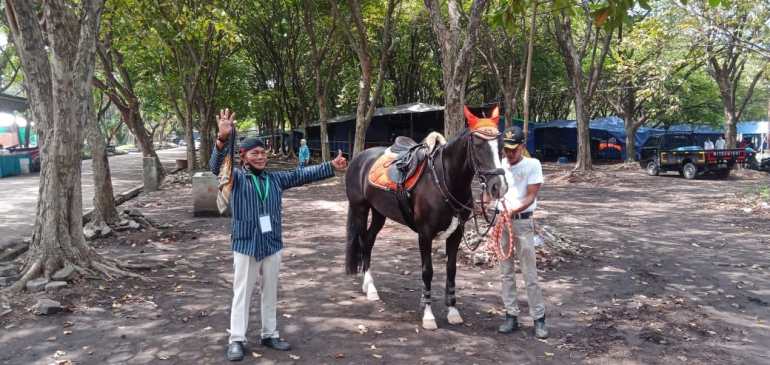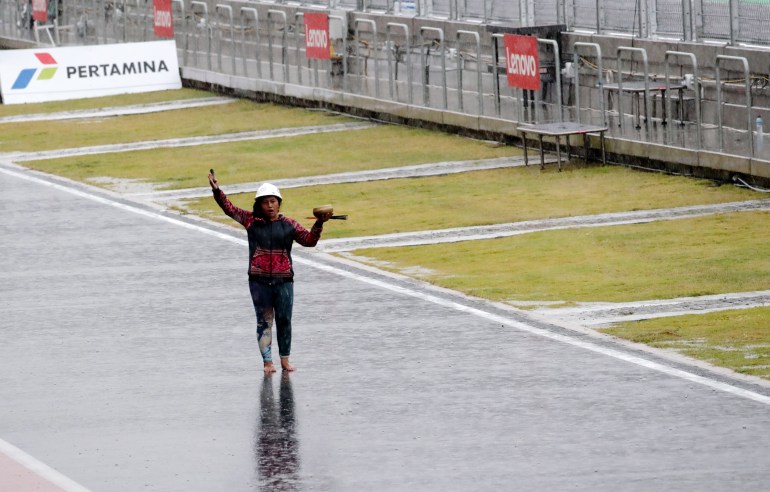Weathering the storm: Indonesia’s rain shamans
Medan, Indonesia – Damai Santoso, who also uses the name Amaq Daud, lives two kilometres away from the Mandalika International Street Circuit which hosted the MotoGP Grand Prix earlier this month on the Indonesian island of Lombok.
The MotoGP, the first time Indonesia had hosted the race since 1997, went viral thanks to an unexpected interlude by 39-year-old Rara Istiati Wulandari, who took to the circuit barefoot and armed only with a singing bowl and incense, as a thunderstorm battered the track.
The ritual was one that Santoso knows well, as he and Mbak Rara (as Wulandari is affectionately known in Indonesia) are pawang hujan or rain shamans, tasked with controlling the weather so that it does not ruin anyone’s big day.
“Rain shamans traditionally ‘move’ weather from one place to another,” Santoso told Al Jazeera. “We do that by praying to God and asking him to help move the clouds. If lots of people ask for it at the same time, they will be heard. God is always close and he will deliver.”
Santoso knows the Mandalika circuit and the surrounding area well as he has lived and worked there since he was born. Every time there is a big event in the area like a party, wedding or a grand opening, he is the man that people call.
Originally from the Sasak indigenous group in Lombok and a devout Muslim, he has been practising as a rain shaman since he was 20 years old. Like almost all shamans, his gift has been handed down over the generations, although not everyone in his family has the ability to control the rain. Santoso, who is now 50, has six brothers and seven sisters but he is the only one in the family in this line of work, and has decided that he doesn’t want to pass his knowledge on to his children because it is too “heavy”.
“You have to fast and you can’t go to the toilet when you are working. You have to be as pure and clean as possible before and during a ritual,” he said. “We won’t be heard by God if we are considered dirty.”

The fact that Santoso is Muslim sometimes raises eyebrows, and some online commentators were quick to blast Mbak Rara’s appearance at the circuit as one at odds with religious norms in Indonesia.
These included Abu Fatihul Islam of the Islamic Geographic Institute, who described the event as a “state-sanctioned heathen outrage” and a sign of “a moral and intellectual crisis,” in the country.
Dicky Senda, a writer and food activist based in Mollo in East Nusa Tenggara, has been working with the local community to catalogue the relationship between residents and how they interact with the natural world, and has interviewed rain shamans as part of his research.
“Many people perceive rain shamans as mystical and superstitious, but it depends how you look at it. The majority of people in Indonesia are religious so they see it from a religious perspective. Much of the commentary we saw following the MotoGP event said that this practice was ‘wrong’ according to religion. But we also need to look at it from the perspective of local religions, which existed years before what we can call imported religions.”
Age-old tradition
Indonesia has six “official” religions including Catholicism, Protestantism, Islam, Hinduism, Buddhism and Confucianism, although animism and Indigenous beliefs long predate the arrival of these religions to the archipelago.
“These rituals have existed for thousands of years, as has the relationship between people and the natural world, but people often use religion as a yardstick to measure traditional practices and say that this is just mysticism or even satanism,” said Senda.

Purnomo, better known as Pak Gofur, a rain shaman based in Surabaya in East Java, learned the practice from his grandmother and told Al Jazeera that he sees no conflict between his religious beliefs as a Muslim and shamanism.
“When we perform a ritual, we burn incense and ask any resident spirits nicely to leave us in peace,” the 67-year-old said. “In Islam we believe in jinn [genies] which are also created by God, so this is not a belief in the occult which is prohibited in our religion.”
He added that a rain shaman’s motives must be pure in order for a ritual to work.
“Is there a guarantee of success? If God is willing and we pray genuinely in our hearts. If we wonder if we will get an envelope [of money] or not, it won’t work. It is not about the money.”
Pak Gofur is so successful at what he does that he regularly travels all over Indonesia, and was recently asked to work for a timber company in Indonesian Borneo to make sure that it did not rain while they were transporting stocks of heavy logs because of the danger from soggy ground.
“The company made me a special camp in the forest and I prayed there every day for a month,” he said. “Thanks to God, it was a success and did not rain.”
At the MotoGP at the Mandalika Circuit, the rain did indeed stop after Mbak Rara performed her ritual, but it did not silence many of her critics.
In addition to the criticisms of a belief in the occult and idolatry, some Indonesian social media users also expressed embarrassment about the ritual, particularly following video footage of some attendees appearing to laugh at Mbak Rara as she chanted in the rain.
“It’s sad people were laughing at it because it means that people like us who are doing research into local customs, and local communities who are trying to preserve them are seen as not important,” Senda said.

Senda also argues that Western knowledge is often used to measure what is considered logical and scientific in Indonesia while local knowledge and traditions are considered unscientific and unresearched.
“The colonial period still has an influence now, including the discrediting of local traditions and beliefs which were thought to be taboo and sinful by the colonisers,” he said.
Indonesia was colonised by the Dutch from the 1800s until independence in 1945, and the Portuguese for more than 300 years before that. The British and Japanese also controlled parts of the archipelago for shorter periods.
“In my research, I have found that local communities often have a very spiritual and close relationship to the Earth that maybe hasn’t yet been scientifically proven but which means that they are very sensitive to their environment and the changing of the seasons and the weather,” said Senda.
“Just because we don’t understand them fully, doesn’t mean that local customs are wrong.”



